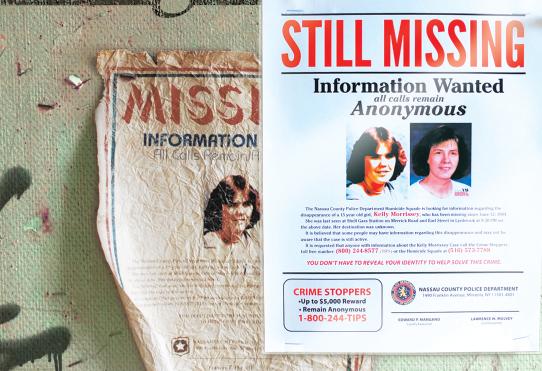

DENNIS HALSTEAD, KOGUT AND JOHN RESTIVO AFTER THEIR RELEASE IN 2003.
“I got the impression she wasn’t getting much supervision,” he told me. “She seemed free to do what she wanted to do. Any kid with a lifestyle like that just doesn’t know what they want. They have no one for guidance,” he said, adding what upset him most was that this was becoming the typical teenager, more the norm than the exception.
What differed with Kelly’s story was that she left home without picking up a paycheck at her job, and without any fresh clothes. Her clothes were laid out on her bed for the next day, indicating she had no intentions of running away.
As the investigation continued and months turned into years, Quinn told me he knew as much about Kelly’s habits as he did about those of his own children. Kelly was rarely out of his thoughts. He personally called more than 100 names he found in her telephone book. He interviewed more than 1,000 people and walked five miles on the Long Beach boardwalk both on the days he worked and the days he was off, hoping to follow leads claiming she was sighted there. Leads from all over the country continued to flow into his office, and he followed up on every one. His personal life became affected, as friends and relatives started telling him he was being overprotective of his own five children, ranging in age from 4 to 10 years old. Quinn’s children grew to know about Kelly, as she became a constant part of his home and professional life. Quinn’s oldest child was also named Kelly.
When we talked about it, he would ask me if I were to consider Kelly’s case, how could he not be so protective. I never told him that I had already been an overprotective mother, but after reporting on this case, I became even worse.
Over the years, Quinn and I built a strong bond. My greatest regret was that at times I felt I let him down. He was so open with me, spent so much time explaining the case, and all I wanted to do was to keep writing stories—every week if I could. But that is not the nature of the news business. My editors at the Times would keep telling me I needed a new angle to update the case, and more often than not, there were none. My other outlets would take the story, and then it became old news.
When Kelly, as a missing person, was too old for the Juvenile Aid Bureau to investigate, Quinn fought hard to keep the case. Eventually the Homicide Squad took it over, and the case was continually assigned to new detectives.
But that didn’t stop Quinn, even if he had to do it on his own time. He would never give up the investigation. I felt the same pull of the case and kept in touch with him.






